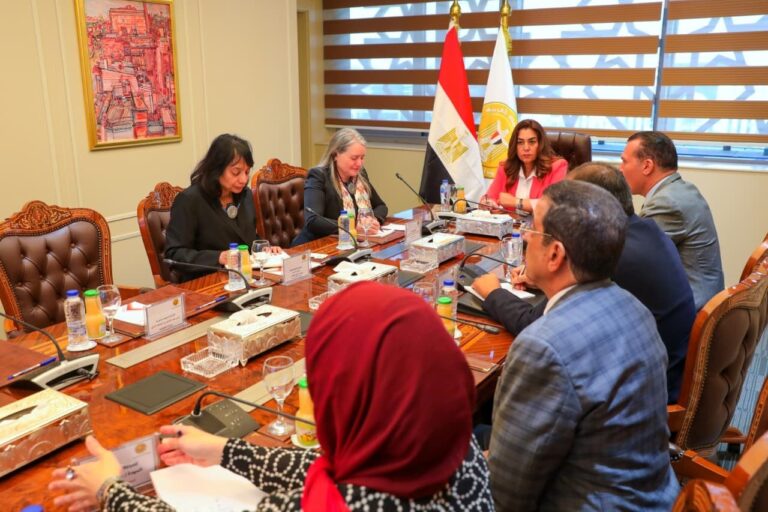Manal Awad, Minister of Local Development and Acting Minister of Environment, met with a delegation from the World Bank’s Independent Evaluation Group (IEG) to review the outcomes of the Upper Egypt Local Development Programme (UELDP) and discuss the ministry’s vision for its next phase.
The meeting was attended by Birgit Hansl, Director of Country Programs and Economic Management at the IEG, and Rashmi Shankar, Lead Economist, alongside Hisham El-Helbawy, Assistant Minister for National Projects and Director of the UELDP, and Hossam El-Kawish, Assistant Minister for International Cooperation.
Awad underscored the ministry’s strong partnership with the World Bank, noting that the UELDP represents one of the most successful cooperation models between the Egyptian government and the Bank. She emphasised that the programme has achieved tangible results in strengthening local governance, upgrading infrastructure, and promoting integrated spatial development across the target governorates of Sohag, Qena, Assiut, and Minya.
Discussions focused on assessing the programme’s impact in implementing infrastructure projects that meet local priorities, creating employment opportunities, and advancing local economic development through industrial clusters, private sector engagement, and enhanced regional competitiveness.
Awad described the programme as “a national success story,” noting that it has transformed local administration and spatial planning by introducing a results-based, performance-driven approach. She added that measurable indicators reflect the programme’s success, achieving a 100% implementation rate across its components and full loan disbursement ahead of schedule, by October 2025.
The minister revealed that the UELDP has generated more than 396,000 direct and indirect jobs through over 5,900 infrastructure and public service projects. These initiatives have boosted local economic activity, raising industrial land occupancy to 90% in Qena and 87% in Sohag, and attracting further private investment and production expansion.
Awad extended her appreciation to the World Bank for its continuous support, noting that the programme’s progress is closely monitored by President Abdel Fattah Al-Sisi and Prime Minister Mostafa Madbouly, who follow up regularly on its implementation.
For his part, El-Helbawy highlighted that the UELDP has driven a comprehensive institutional transformation in local governance by empowering governorates to make strategic decisions and enhancing their executive capacities through local implementation units. He added that the programme promotes citizen participation in decision-making through participatory planning mechanisms.
He further noted that the initiative has strengthened trust between citizens and government institutions, introduced performance-based financial transfers, and improved the management of local industrial zones. These reforms, he said, are now being scaled up nationally, supporting Egypt’s broader shift toward human capital development, infrastructure investment, and sustainable local governance.
For her part, Birgit Hansl praised the programme’s effectiveness and congratulated the Egyptian government on its achievements, particularly in private sector engagement, job creation, and international recognition. She described the UELDP as “a benchmark for development programmes in the region.”
Concluding the meeting, Minister Awad reaffirmed the ministry’s commitment to sustaining and institutionalising the programme’s results, integrating its policies into national frameworks, and continuing to build local capacities to ensure long-term impact and continuous improvement.
Images are for reference only.Images and contents gathered automatic from google or 3rd party sources.All rights on the images and contents are with their legal original owners.

